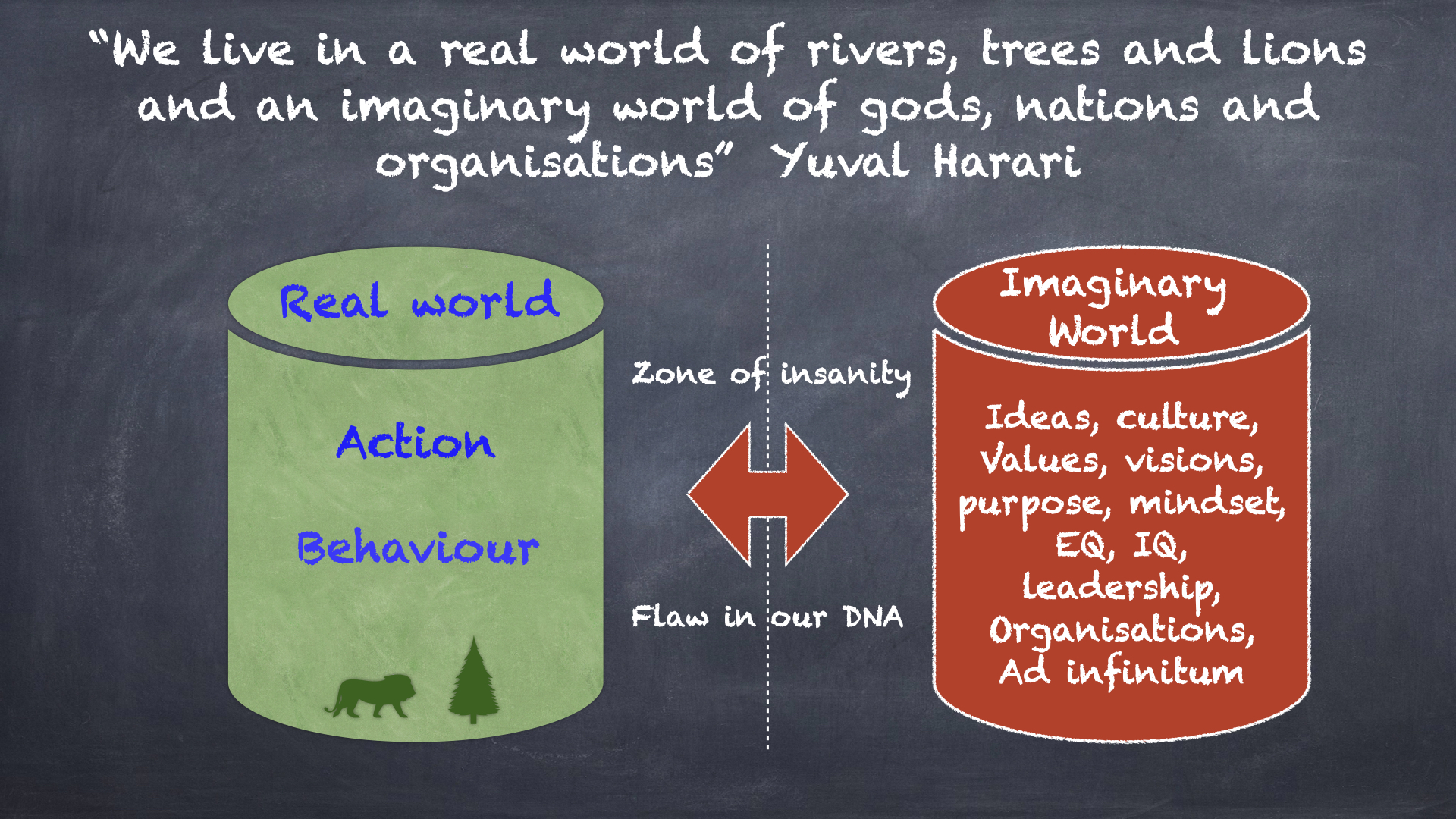So you think your organisation is real? Think again
"We often talk of saving the planet, but the truth is that we must do these things to save ourselves. With or without us, the wild will return."
David Attenborough
"Imagination is more important than knowledge. For knowledge is limited, whereas imagination embraces the entire world, stimulating progress, giving birth to evolution." Albert Einstein
A Path to Wisdom
Every now and again a real diamond emerges from the cacophany and dust of organisation and leadership dialogue.
And Yuval Harari of Sapiens fame has given us the most valuable of gems, highlighting the difference between the real world we live in and the imaginary world of nations and organisations where we spend much of our time.
"We live in a real world of rivers, trees and lions and an imaginary world of gods, nations and organisations."
Pure genius. Simple, but filled with infinite wisdom.
Why does this matter?
Sometimes we are not able to distinguish between the real and our imaginary worlds. We suffer from a type intellectual dyslexia. And it may be terminal.
Let's look at some examples.
THE ORGANISATION
I am sure that we would all agree that in order for a system to exist, it must have a boundary. Take your own organisation. Where is its system boundary?
Exactly. You cannot find it. It doesn't exist in the real physical world.
At best it resides in the unknowable collective minds of people. It is imaginary.
ORGANISATIONAL CULTURE
Everyone talks glibly about organisational culture as if it exists. But does it?
We may use words such as friendly, caring, innovative or toxic, but these impressions exist in our minds only. What exists in the real world are actions and behaviours, in an infinite and ever-changing four dimensional world. An infinite latticework of continuous evolution, where everything that is said and done happens for the first time.
Thus based on each of our unique experiences of an organisation, we create a picture - effectively an illusion - to make sense of the organisation. And we call this culture. We delude ourselves into thinking that this story of 'culture' is somehow static and equally real for everyone.
VALUES - ALWAYS TRYING TO SLIP UNNOTICED INTO THE REAL WORLD
Again many people will argue quite vociferously that values exist. The question is, if they exist, where do they exist?
Exactly, only in the imaginary world.
What exists is behaviour and action in a complex, chaotic and dynamic world. It is simply ludicrous to attempt to transpose this into one linear, discrete and imaginary word. It may give comfort, but not real meaning.
Take the 'value' honesty for example. We all know that we may espouse honesty as an important and guiding value, but we generally apply it in practice on a scale from gross dishonesty to remarkable honesty.
It all just depends, doesn't it?
MINDSET
Mindset is a more recent imaginary annoyance that has drifted across the ocean. We are encouraged to change our 'mindsets'. In instructional language that simply assumes that this remarkable new box of tricks actually exists. Of course it does not. It is yet one more imaginary organisational coat hook.
The unfiltered and boundaryless organisational lexicon
I could go on, but i won't. You get the picture. But here is the rub.
It does no harm to live in our imaginary worlds, as long as we stay there. It can become downright dangerous when we attempt to transpose - magically - that which is imaginary into that which is real.
Two examples.
The new dangers of nationhood. Harari reminds us that nations too are imaginary. There is no doubt that the concept has generated both conflict and identity on the one hand, with remarkable technical evolution and success on the other.
The current crisis in Ukraine however is a stark reminder of the very real existential danger of attempting to convert an imaginary vision of glorious nationhood into the real world of rivers, trees and lions. In the days of bows and arrows no real harm was done. But today with close on 20,000 nuclear warheads shared by nine imaginary nations and their potentially unstable 'leaders', we are clearly on the edge of a specie-ending precipice.
Environmental damage.
For example we know that as a specie we are doing untold damage to the planet. This is not imaginary. If you have one hundred trees this year and you chop down fifty, then next year you will only have fifty trees. Why is this so difficult for some people to understand?
Our impact is real and measurable. As David Attenborough has said, "We live in a finite world. Anyone who thinks we can generate infinite growth in a finite world is either a madman or an economist."
Of course if we focus on organisations, exactly the same insanity prevails. At the molecular level each organisation imagines itself in a world of infinite possibility, with its imaginary vision and purpose, engaged and happy employees, profits and happy shareholders.
Further we imagine at the corporate level that the new-fangled ESG methodology will somehow rescue both us and the planet. Best to just put it back in its imaginary box.
Wisdom redefined
Based on the deep and important insights of Yuval Harari, I would like to offer the following definition of real and effective wisdom.
Wisdom is the ultimate expression of human energy. It combines the intelligence and insight to know the difference between that which is imaginary and that which is real on the one hand, with the ability to convert this creative knowledge into action which contributes to the infinite preservation of our planet, on the other.
Comments
By accepting you will be accessing a service provided by a third-party external to https://quanta.consulting/

